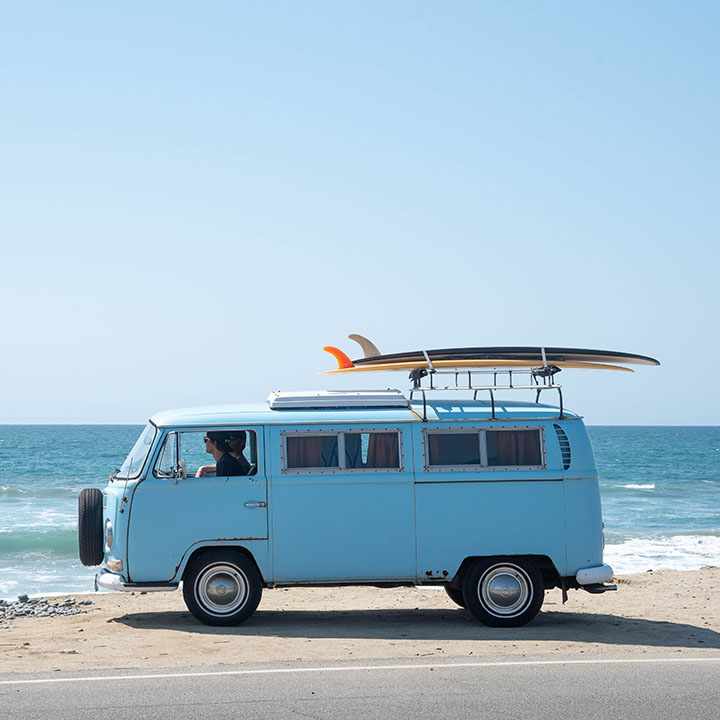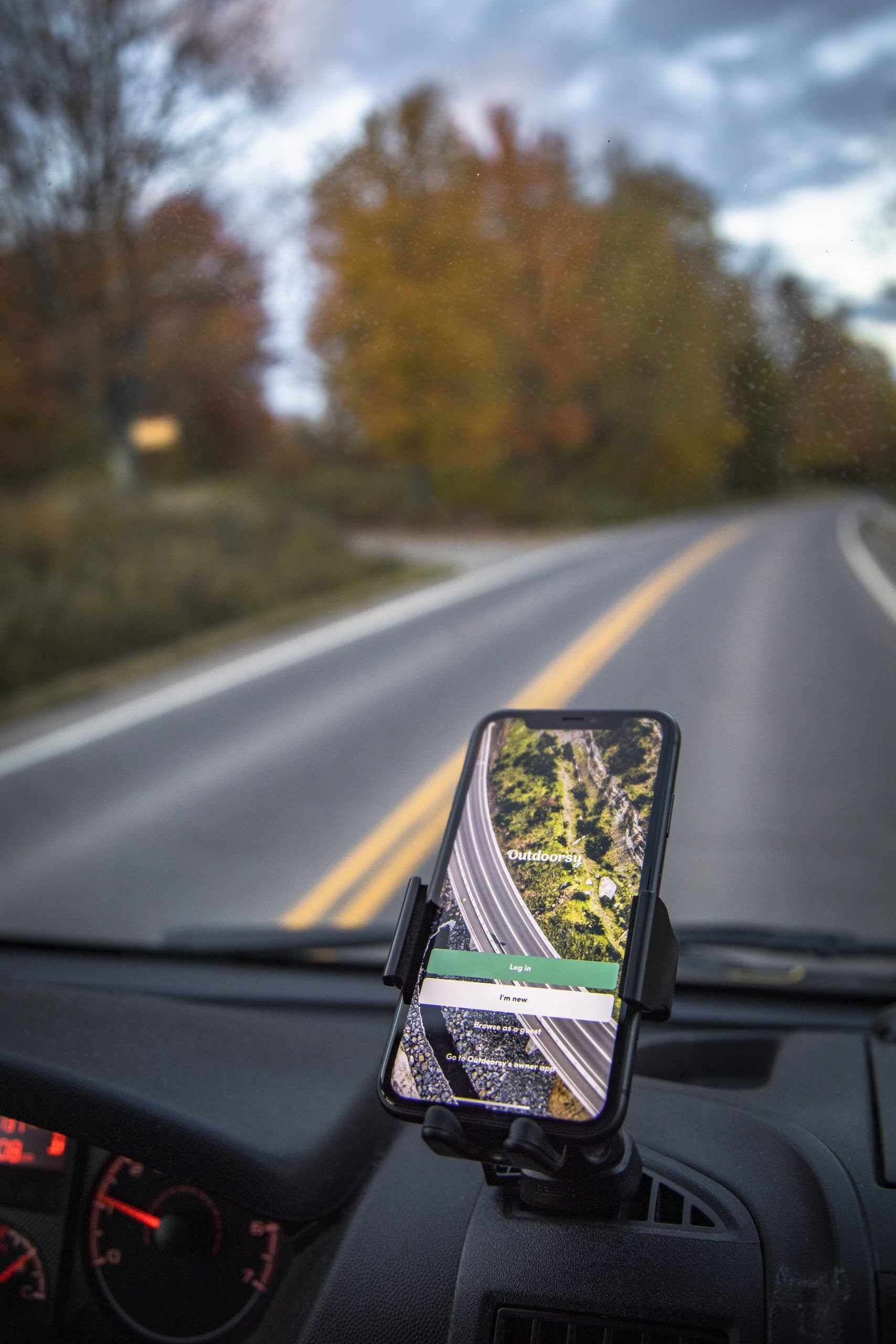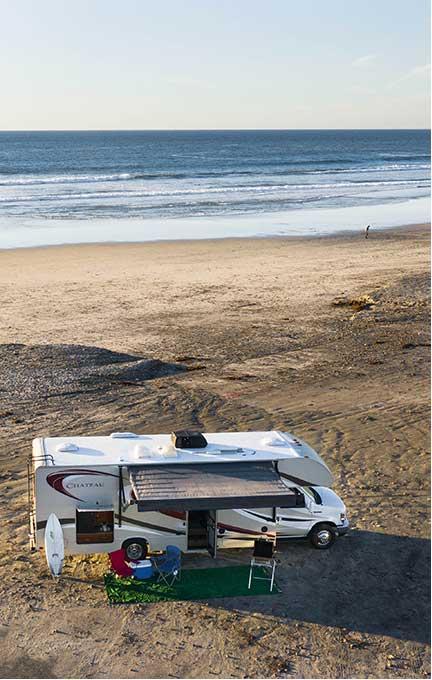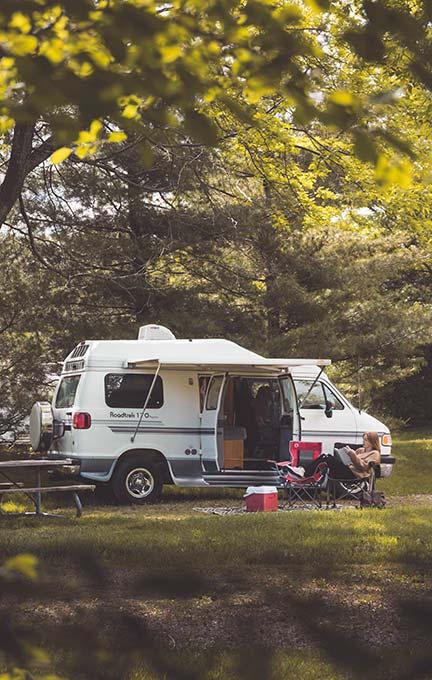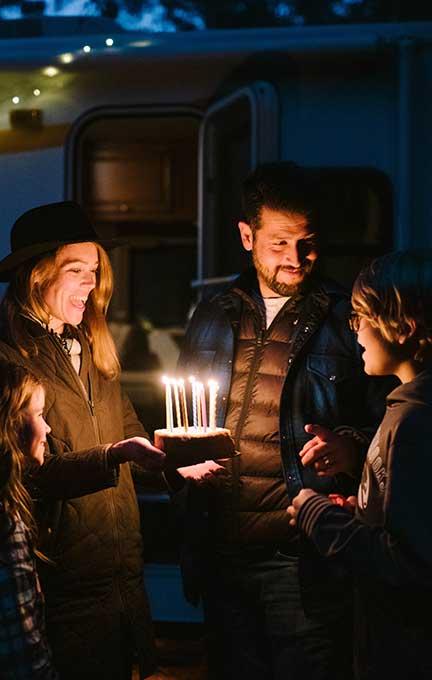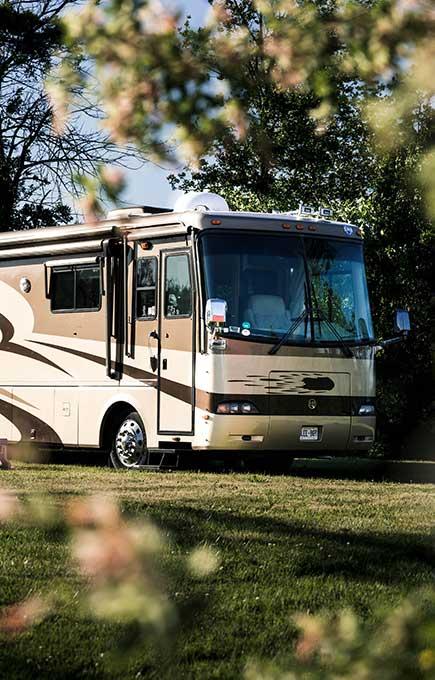You’ve already decided that you are going to welcome a new addition to your family: an RV! You don’t have to be talked into the benefits of family camping and vacations in the great outdoors. You may have even decided that renting out your new purchase on those dates when you can’t enjoy using it would be a terrific financial decision. Now you just need to figure out how you’re going to purchase an RV on a tight budget.
One way of narrowing it down is by renting an RV to test out different styles of affordable RVs you might like.
Try an affordable RV rental near you
New motorhomes, trailers, and vans can be as expensive as small homes these days, and even used vehicles can send your budget into a tailspin. But don’t be dismayed! There are so many ways to buy that perfect RV and not break the bank in the process. In this article, we’ll break down five tips for purchasing an RV on a tight budget:
- Saving and budgeting for the purchase
- Looking at used RVs
- Searching online for deals
- Considering your financing options
- Limiting unnecessary add-ons
For most people, the decision to buy an RV is not an impulsive one, and it can take a while to pick out the right rig and make the purchase. Here’s how to have the best experience.

Tip #1: Start Saving to Purchase an RV
First and foremost, it’s always a great idea to put away as much money toward your purchase as you can. Start saving now! And if you don’t have anything extra to throw into the RV account, think again. Here are a few easy ways to create more savings:
- Make some small adjustments like not spending your change each day. Instead, put it in a piggy bank or savings account, away from spending temptation. That can easily add up to $40 to $50 per month.
- Assess the number of channels you really watch on your satellite television plan. Consider cutting your package back or cut the cord entirely. (I saved $75 a month toward a motorhome purchase this way – that’s $900 a year.)
- Cook more at home rather than eating out. That alone can save anywhere from $100 to $500 per month, depending on how often you’ve been dining at restaurants.

Photo Credit: Shelley Dennis
Tip #2: Look at Used RVs
Unless you are dead set on purchasing a brand new RV, make it your goal to find a well-cared-for used vehicle. Since RVs generally depreciate, you can save quite a bit by purchasing a model that has seen some use already. And no, this doesn’t mean that you have to be driving around an old clunker. You’d be surprised what kind of discounts you’ll find on models that are only a few years old.
Not only will used RVs be cheaper to begin with, but you’ll also find yourself in a better negotiating position at the dealership. If you play your cards right, you may walk away with a few extra perks thrown into your purchase. You can find out more about the pros and cons of buying used in this video below from RV Masters.
Keep in mind that you can do some updating with very little cost once you find that perfect recreation vehicle. There are tons of ideas floating around out there for upgrading and renovating trailers and motorhomes. You can even accomplish large projects— like finding new RV furniture— relatively cheaply!

Tip #3: Look Online for RVs
Don’t be afraid to look beyond the dealership. Start looking for your RV on Facebook Marketplace, Craig’s List, LetGo and other apps that have local connections. Just like cars, you can usually get a better price from private owners. Plus, they can give you the complete history of the vehicle.
You can even expand your search beyond local offerings online. You might find the perfect rig listed a few states down. Bringing it home can be the first trial run road trip.
Try Before You Buy: RVs For Rent Near You
Tip #4: Consider Financing Options
If the stars all align and you’ve done your due diligence saving for your dream RV, you might be in the position to purchase it with cash. But if that perfect camper appears and you haven’t quite reached your goal, there are several financing options available to make sure you don’t miss out on the opportunity.
Here are a few things to keep in mind when financing:
Credit Unions Often Have Good Rates
Consider opening up a checking or savings account with a credit union in advance of your purchase. They tend to offer better terms and rates for loans. Then, if the amount you need to complete your purchase is not huge, you may be able to get a “Signature Loan,” which doesn’t require the credit union to hold the title on your RV.
You May Have to Purchase a Newer RV
There are some really nice older motorhomes out there that still have a lot of life left in them. I should know – I have one that rocks! But if you cannot pay cash outright for a rig that is over 10 years old, you will find yourself in a financing conundrum. Very few lending institutions will offer loans on older vehicles, but if they do, the terms are horrendous! So set your sights on something a little newer if you don’t have the full purchase price saved up.

Consider Buying the RV with Other People
Do you have good friends that are also interested in purchasing an RV and renting it out for income? Why not consider a partnership? Each of you puts up half of the cost to buy the vehicle, schedules separate usage times for family vacations, etc., and splits half of the income when you rent it out. It might be a great way to get started in the RV rental market!
Check Out Financing Options Other Than Financial Institutions
Is there a family member that might make you a short-term loan to cover the remaining amount you need to purchase that RV? Make the terms appealing to them. For instance, if they have money in a savings account or CD, offer a better rate of return with your monthly payments to them.
You may even find a seller who is willing to finance your purchase from them. Be prepared with a large down payment, and chances are that the length of the loan will be quite short (possibly a year or two). Make sure to have official documents written up, with a schedule of payments and terms agreed to by all.

Photo Credit: Shelley Dennis
Tip #5: Limit Unnecessary Options
Getting an RV with all of the bells and whistles may be your dream. But keep in mind, if you will be renting it out, your renters probably aren’t going to utilize those heated towel bars very often.
But they would see an immediate benefit in a tankless water heater. They may be longing for a family outing in a rig that has a convenient outdoor kitchen. They probably also want to take along their bikes or have ample space to play board games on a rainy day.
Do some research to see what amenities RVers use most. (Here’s a great checklist.) Then find the motorhome or trailer that best fits your needs AND theirs. You will be happier with your purchase and you’ll see your income increase as renters realize that you offer the perfect “escape” vehicle!
The Best Types of RVs for Budget Shoppers
If you’re shopping for an RV on a tight budget, certain types of RVs offer more affordability without sacrificing the essentials. Here’s a breakdown of the best options for budget-conscious buyers:
Travel Trailers
Why they’re budget-friendly: Travel trailers come in a wide range of sizes and prices, making them a great choice for those looking for versatility. Smaller models like teardrop trailers are especially affordable.
Key benefits:
- Lightweight and easy to tow with most vehicles.
- Simple maintenance compared to motorized RVs.
- Ample variety on the used market.
- Price range: Used models can start as low as $5,000, with new options available around $10,000 to $20,000.
Pop-Up Campers (Fold-Out Trailers)
Why they’re budget-friendly: Pop-up campers are lightweight, compact, and often the most affordable option for families or weekend travelers.
Key benefits:
- Easy to store and tow.
- Provides essential features like sleeping areas and small kitchens.
- Perfect for casual camping trips.
- Price range: Used models start at $2,000, with new models typically ranging from $8,000 to $15,000.
Class B Motorhomes (Camper Vans)
Why they’re budget-friendly: While new Class B motorhomes can be pricey, the used market is filled with older models that are cost-effective and practical for solo travelers or couples.
Key benefits:
- Compact and easy to drive.
- Lower fuel costs compared to larger motorhomes.
- Ideal for stealth camping and urban exploration.
- Price range: Older used models can be found for $10,000 to $20,000.
Older Class C Motorhomes
Why they’re budget-friendly: Class C motorhomes strike a balance between size, comfort, and cost. Older models, especially from well-known brands, can be a great bargain.
Key benefits:
- Built-in living space, kitchen, and bathroom.
- Easier to drive than larger Class A motorhomes.
- Plenty of options on the used market.
- Price range: Older models often sell for $15,000 to $30,000.
DIY Camper Conversions
Why they’re budget-friendly: For those who are handy, converting a van, bus, or cargo trailer into an RV can be significantly cheaper than buying a pre-made RV.
Key benefits:
- Complete customization to fit your needs.
- Potential to save thousands compared to new RV prices.
- Ideal for minimalist travelers.
- Price range: DIY conversions can cost as little as $5,000, depending on the base vehicle and materials used.
Older Models of Fifth Wheels
Why they’re budget-friendly: While fifth wheels can be expensive new, older models offer plenty of space at a fraction of the cost. They’re ideal for stationary living or long-term stays.
Key benefits:
- Spacious interiors with separate living areas.
- Great for families or extended trips.
- Often equipped with luxurious features.
- Price range: Older models start around $10,000 to $20,000.
Tips for Choosing the Right RV
- Set a clear budget: Know your maximum price range and stick to it.
- Consider towing capacity: Make sure your current vehicle can tow your chosen RV type.
- Inspect thoroughly: When buying used, check for signs of wear, leaks, or damage to avoid costly repairs later.
By focusing on these budget-friendly RV types, you can find the perfect RV to fit your lifestyle without breaking the bank.
The Hidden Costs of Buying an RV
When buying an RV on a tight budget, it’s essential to consider the hidden costs that can quickly add up. Beyond the purchase price, you’ll need to account for expenses like registration, insurance, and regular maintenance, such as oil changes or roof resealing. Additional costs include campground fees, fuel (which can be substantial for larger RVs), and possible storage charges if you don’t have space at home. Repairs on older or used RVs can also be costly, especially for major systems like plumbing or electrical. Planning for these expenses is crucial to avoid financial surprises down the road.
Shopping for an RV on a Budget FAQ
How can I negotiate the price of an RV?
Do your research to understand market values and use any issues you find during the inspection as leverage. Be willing to walk away if the seller isn’t flexible. Buying during the off-season or at RV shows can also increase your chances of getting a discount.
What’s the best time of year to buy an RV?
The off-season (late fall and winter) is often the best time to find deals, as sellers and dealerships are more motivated to clear inventory.
Are there alternatives to buying a traditional RV?
Yes! Consider DIY camper conversions, teardrop trailers, or even renting an RV if you’re not ready to commit to a purchase.
How can I avoid scams when buying a used RV?
Always inspect the RV in person, request maintenance records, and avoid deals that seem too good to be true. Verify the seller’s identity and ensure all paperwork is legitimate before making a payment.
What’s the best way to save money on RV living after the purchase?
Use memberships like Passport America or Good Sam for campground discounts, boondock to save on site fees, and handle basic maintenance tasks yourself to cut costs.
You CAN Own an RV on a Budget
As you can see, your budget might be tight, but there are a variety of ways to get the RV you’ve been dreaming of and even put it to work for you. Be sure to look at all of the options Outdoorsy has to help you turn your dream of business ownership into reality!
